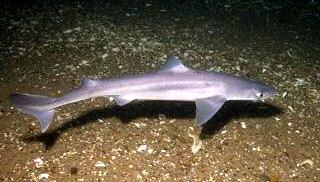
Sharks are the main bycatch group for pelagic longline fisheries. Shark interactions with fisheries can have negative financial and safety consequences for fisheries and are destructive to shark populations. A product that could deter sharks from fisheries that has no negative effect on the target fish would benefit both fisheries and shark populations.
Sharks, unlike other fish, have sensitive electrosensory systems that allow them to detect voltage gradients in their environment. Sharks' electroreceptors can detect lanthanide elements, which naturally lose electrons and create negative charge distributions in seawater. Some studies have shown that lanthanide metals deployed with bait repel sharks and decrease their consumption of bait, while other studies have had contradictory results.
Jordan et al (2011) tested the behavioral responses of two shark species, Squalus acanthias and Mustelus canis, to neodymium (Nd), a lanthanide metal. The sharks in the study were presented with food affixed to treatments of acrylic, stainless steel or neodymium. S. acanthias would only feed in groups and fed from the neodymium treatment significantly less frequently than from either control. M. canis was tested both individually and in groups. When alone, M. canis individuals fed less from the neodymium, however, when they fed in groups they fed significantly more from the neodymium treatment. These results confirm that there is variability in response to lanthanide metal both across species and within a species in the presence of competition.
Read the article here
Jordan, LK, Mandelman, JW and Kajiura, SM. 2011. Behavioral responses to weak electric fields and lanthanide metal in two shark species. Journal of Experimental Marine Biology and Ecology 409(1-2): 345-350.
Photo credit: NOAA
Featured Bycatch Species

Non-target benthic invertebrates are caught as bycatch in huge volumes, but precise numbers are not available.
